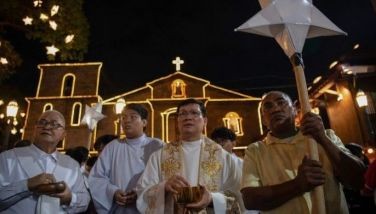Responsible mining can help communities, says Cebu priest
April 17, 2006 | 12:00am
TOLEDO CITY — There is such a thing as responsible mining. Done properly, according to a Catholic priest based in this Cebu city, mining is a powerful response to chronic underdevelopment and poverty.
Fr. Michael Hisoler, parish priest of Mt. Carmel Parish in Barangay Don Andres Soriano near Toledo City, made this statement in a homily while celebrating Mass during a visit of 29 barangay chairmen and mining executives from Mindanao.
Hisoler said he believes mining companies will benefit their host communities through taxes, socio-economic projects, and employment.
Toledo City is home to the Atlas Consolidated Mines, which in its time was one of the biggest and oldest copper mines in Asia. Atlas ceased operations in 1994 after over 40 years in the business.
A major flood destroyed one of its tunnels, and the then precarious price of copper in the world market prevented the giant firm from recouping its losses.
The passage of the Mining Act of 1995, whose constitutionality was recently upheld by the Supreme Court, prompted new investors to begin infusing fresh capital into the project. Today, Atlas is poised to make a comeback.
Hisoler has been in Barangay Don Andres Soriano, formerly called Lutopan, since 1997. At that time, the mines were already closed, but its benefits to the community were still evident, he said.
In his homily last Friday, he said Toledo became a city precisely because revenues from the mines enabled it to qualify for cityhood. Many of the city’s menfolk were hired to work in the mines in various capacities.
Some Catholic bishops have raised their concern over the supposed dangers of mining, particularly to the environment.
Hisoler said such apprehensions are only natural, but added that it is precisely because of such concerns that mining firms must observe the highest international standards of safety and risk management.
"Responsible mining must be observed at all times," he said.
When such issues as environmental protection are adequately addressed, Hisoler said there is no reason to doubt the strategic importance of the mining industry.
"Many of the things we take for granted such as our watches, ballpens, and eyeglasses contain mineral compounds that have been mined," he reminded his parishioners.
To deny the entry of mines on account of fears that may be responsibly addressed is to deny modernity its natural course, he added.
Hisoler said there is no conflict between God and the mining industry. When mines are able to contribute to the welfare of the people, this should be taken as a blessing from God, he said.
His parishioners are no strangers to God’s gifts such as their faith and fortitude to build and strengthen their own basic ecclesial communities, he said.
Working with private sector entities such as mining firms in order to sustain a progressive community is certainly a God-given privilege, he added.
Fr. Michael Hisoler, parish priest of Mt. Carmel Parish in Barangay Don Andres Soriano near Toledo City, made this statement in a homily while celebrating Mass during a visit of 29 barangay chairmen and mining executives from Mindanao.
Hisoler said he believes mining companies will benefit their host communities through taxes, socio-economic projects, and employment.
Toledo City is home to the Atlas Consolidated Mines, which in its time was one of the biggest and oldest copper mines in Asia. Atlas ceased operations in 1994 after over 40 years in the business.
A major flood destroyed one of its tunnels, and the then precarious price of copper in the world market prevented the giant firm from recouping its losses.
The passage of the Mining Act of 1995, whose constitutionality was recently upheld by the Supreme Court, prompted new investors to begin infusing fresh capital into the project. Today, Atlas is poised to make a comeback.
Hisoler has been in Barangay Don Andres Soriano, formerly called Lutopan, since 1997. At that time, the mines were already closed, but its benefits to the community were still evident, he said.
In his homily last Friday, he said Toledo became a city precisely because revenues from the mines enabled it to qualify for cityhood. Many of the city’s menfolk were hired to work in the mines in various capacities.
Some Catholic bishops have raised their concern over the supposed dangers of mining, particularly to the environment.
Hisoler said such apprehensions are only natural, but added that it is precisely because of such concerns that mining firms must observe the highest international standards of safety and risk management.
"Responsible mining must be observed at all times," he said.
When such issues as environmental protection are adequately addressed, Hisoler said there is no reason to doubt the strategic importance of the mining industry.
"Many of the things we take for granted such as our watches, ballpens, and eyeglasses contain mineral compounds that have been mined," he reminded his parishioners.
To deny the entry of mines on account of fears that may be responsibly addressed is to deny modernity its natural course, he added.
Hisoler said there is no conflict between God and the mining industry. When mines are able to contribute to the welfare of the people, this should be taken as a blessing from God, he said.
His parishioners are no strangers to God’s gifts such as their faith and fortitude to build and strengthen their own basic ecclesial communities, he said.
Working with private sector entities such as mining firms in order to sustain a progressive community is certainly a God-given privilege, he added.
BrandSpace Articles
<
>
- Latest
- Trending
Trending
Latest
Trending
Latest
Recommended




























